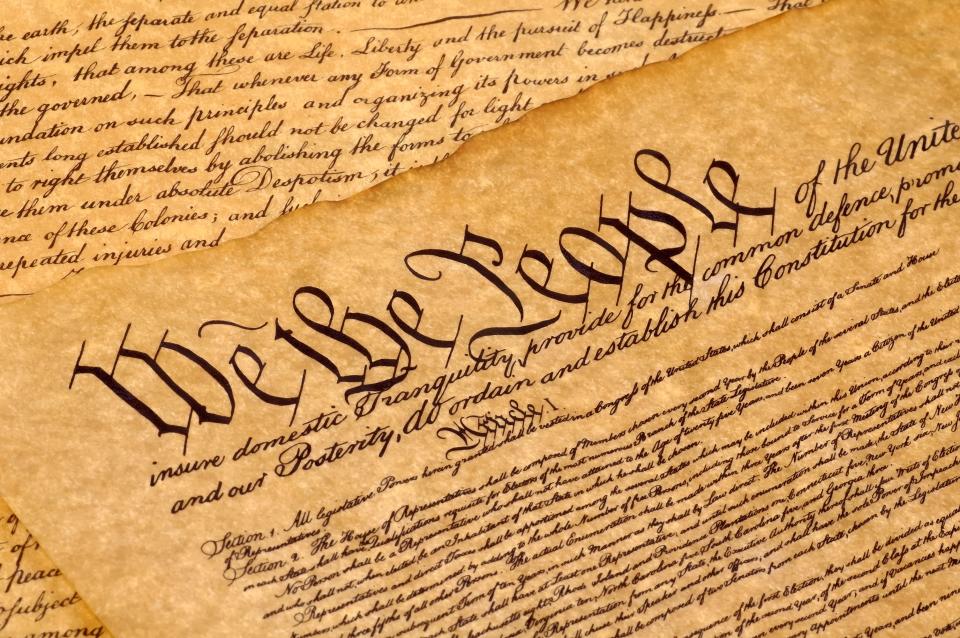Democracy or Constitutional Republic: Which is it in America?
Mercyhurst University professor and political science department chair Joseph Morris views a particular course as the most important he teaches.
His Introduction to American Government class is an option for all students working to complete the liberal arts core curriculum. He themes this course around the question of whether the United States is a democracy or constitutional republic because he said he believes it's critical for citizens to think about the distinction and what it means for our nation.
"Their future depends on a functioning political system," Morris told the USA TODAY Network.
Debates that pit our nation's status as democracy or constitutional republic tend to intensify around specific policy debates or more generally among candidates in high-profile elections, such as the one that will take place Nov. 5. The political rhetoric can be a reminder that our system of government contains elements of both.
"The framers of the Constitution gave us a constitutional republic," Morris said.
"However, U.S. political history is nothing more than a history of democratization. So today we are a democratized republic. We have all of the institutions that the framers of the Constitution gave us, but we've made changes ... to allow greater participation by its citizens."
Is the U.S. a pure democracy?
Over time, the United States system of government has evolved to more democratic institution in several tangible ways.
Voting rights were initially kept from women, anyone who wasn't white and anyone who didn't own property. Electors and U.S. senators were selected by members of state legislatures instead of by popular vote.
John Hare, a lawyer and court observer in Philadelphia, said the nation's Founding Fathers implemented a republican-style system in part as a safeguard against the excesses of pure democracy, in which a simple majority rule could conceivably hold too much power.
"It's sort of a very intricate and carefully balanced system that is not perfect, but is unique and has stood the test of time," Hare said. "They were also trying to create a brand-new form of government. It is a living system, and it's designed to evolve within certain parameters.
"We do lose sight of that in the rhetoric of an election seasons."

'It's just about power'
It's important to frame this debate in the context of nation's birth, said Boris Heersink, associate professor of political science at Fordham University in New York. He pointed out that the American Revolution was spearheaded by a wealthy aristocracy.
"We sort of live in two different worlds," in relation to our status as a democracy and republic, Heersink said.
"I think a lot of the confusion and debate (is because) the Constitution doesn't really talk about voting a lot. On the other hand, we've developed into that system, and it's now been in long enough that we think of voting as a right. A lot of that is mostly state-level-based."
Many public debates about democracy-versus-republic, according to Heersink, are thinly masked attempts to alter or preserve a status quo that benefits a party or candidate for at least the short-term.
Opinion: Democracy in America will only die if we let it
A recent point of contention in Pennsylvania was Gov. Josh Shapiro's unilateral decision to implement automatic voter registration in September. Anyone eligible to vote is enrolled to do so while obtaining a driver licenses and ID card in Pennsylvania, unless they opt out.
Some — including state Sen. Cris Dush, R-Jefferson, chair of the State Government Committee — protested that automatically enrolled voters are more likely to be disengaged and ill-equipped to make decisions about our republic.
“Pre-checked registration ... encourages people to sleepwalk their way into being registered, potentially without understanding the significance of their actions," Dush wrote in a press release. "It risks turning a solemn duty into a thoughtless action, exploiting the system to catch the unwitting, the uncertain and the unintentional, making a mockery of that solemn duty."
Shapiro and fellow Democrats argued that automatic voter registration strengthens democracy by making it easier for Pennsylvanians to begin participating in the process.
"And what they come up with isn't necessarily based on the Constitution, either," Heersink said, speaking generally about these sorts of debates. "What people are allowed to vote? And how easy or hard do you make it for them to vote? All of that has always come down to partisanship."
"Fundamentally it's just about power," he added.
More: What could trigger costly, time-consuming election recounts in Pa.? 3 signatures and $50
'The citizens that democracy demands'
Over its 248 years, the United States has developed a more inclusive system of governance.
From Morris' perspective, this is because Americans have demanded something closer to pure democracy. In many cases they've been successful, which means that the mass population has been entrusted with an increasing responsibility.
The chief challenge for contemporary Americans, as he sees it: "Can we become the citizens that democracy demands?"
Bruce Siwy is a reporter for the USA TODAY Network's Pennsylvania state capital bureau. He can be reached at bsiwy@gannett.com or on X at @BruceSiwy.
This article originally appeared on York Daily Record: Are 'We the people' part of a democracy or constitutional republic?

